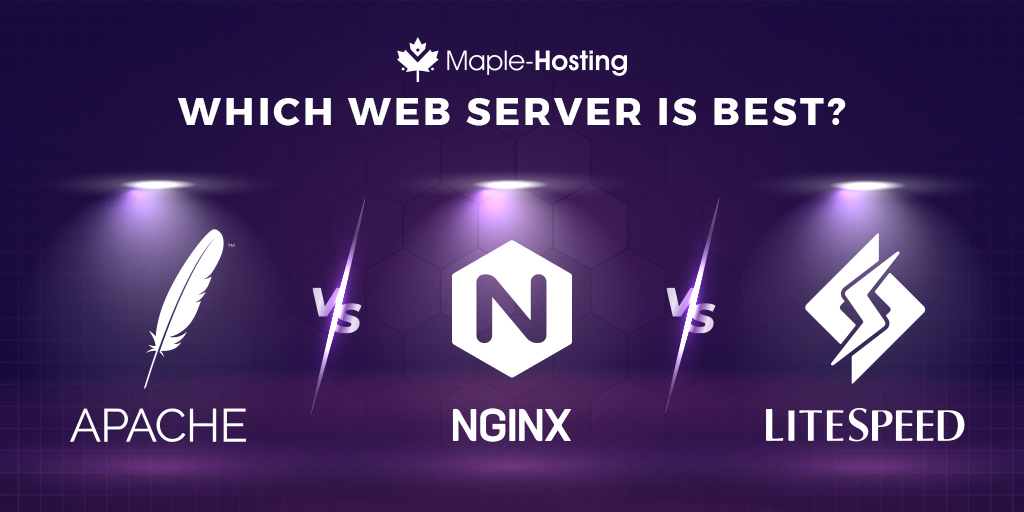
You’re always taking extra steps to make sure that your business is healthy and running smoothly. You make sure that you put time and effort into projects that will expand your business. You’re proud of how far your business has come since you started it, and it’s been going very well thanks to your efforts.
But rapid expansion comes with its own problems. For starters, it’s completely possible to outgrow your online space.
You may need a dedicated server to host your website. But it’s impossible for a dedicated server to run without also having a web server such as Apache, Nginx, and Litespeed.
So how do you choose a web server? And what’s the difference between a dedicated server and a web server?
Your company is ready to have its own server space. That’s why this guide will walk you through the differences between Apache, Nginx, and LiteSpeed web servers and which one is right for your business.
What Is a Web Server?
Web pages are essentially large documents that can be highly customized by their creators. This means that the internet is a large archive of information that simply retrieves the desired document when asked for it. Imagine walking through a library and looking for a specific book.
But no personal computer is large enough to actually store all of that information on its hard drive. Instead, servers store information so that when your device requests a certain document, it’s always in the same location. Web servers receive and complete requests provided by your device.
In other words, the server is the shelves of books in the library, and the web server is the librarian that’s helping you find the right book.
Apache
Apache is the oldest of these three. It was created in 1995 as an HTTP server designed to support web hosting in the early days of the internet. Its momentum didn’t stop back then, either; it’s still a leader in the web hosting industry.
It is also by far the most popular right now. In fact, it practically dominates the market. This is due in part to the fact that it comes pre-installed on all major Linux distributions. In other words, you don’t have to pay extra for it when you buy Linux products.
It’s also extremely user-friendly and more than capable of hosting your website. It’s a good option for those who want something a little more customizable. It has a lot of add-on options that can be purchased later if needed.
It’s also considered the most beginner-friendly program of the three, as it’s easy to set up. It does really well at running programs that use CGI.
The biggest drawback that most people find with Apache is that it simply isn’t designed to handle large loads of requests.
To start with, it consumes the most RAM under heavier loads of the main three web servers. It’s also the least efficient because it has to create new processes for each new request that it comes across. Essentially, if you use an Apache web server and you get a lot of requests at once, it can cause your entire server to crash.
Using certain add-ons to Apache can also impact security updates, leaving your information vulnerable.
Nginx
Nginx, pronounced “Engine-X”, was released in 2004 specifically to improve the function of Apache servers. At that time, it was primarily a reverse proxy and load balancer that you could pair with Apache. The idea was to prevent the problems caused by the .htaccess files that Apache runs, as well as server overload.
Back then, most people used Nginx and Apache in tandem to host their websites and ensure everything ran smoothly. Today, Nginx is able to be used as a web hosting server all on its own.
In fact, Nginx uses significantly less memory than Apache. This means that you can host more websites on a server of the same size. It can also handle up to four times more requests at a time than an Apache server.
If your website runs a lot of programs written in Python or Ruby, then this is the server for you. It’s known for running such programs really well.
Its main drawback is that it’s hard to use and set up. Unlike Apache, Nginx is not as beginner-friendly or user-friendly. It can become even more of a pain if you need to host programs that require CGI.
This can be a drawback for those who are new to web hosting. It’s possible to hire experts to help you set these servers up the way you like them, but that just costs extra money for you.
LiteSpeed
LiteSpeed is the newest of these three server types. It has been rapidly growing in the web hosting field because it’s extremely efficient. So efficient that companies that switch from Apache to LiteSpeed servers can potentially double the number of websites that their servers can handle.
LiteSpeed servers are also very customizable. You can get add-ons for it that can make it ideal for running apps like WordPress and MediaWiki.
It’s also one of the most secure servers by far. A common problem for other servers is denial-of-service attacks. This is when someone sends a malicious request to a server with the intention of shutting the server down.
The last thing any company wants is for their websites to go down because of hackers. These servers have built-in protection from these attacks.
The efficiency of these servers also means that admins won’t need to work on server maintenance very often. When they do need to, this maintenance can be done quickly to keep your website’s downtime as low as possible.
In short, LiteSpeed is the most efficient, reliable, and secure of these three types of servers. They’ve even been shown to outperform Nginx in nearly every web hosting category.
Choose Between Apache, Ngnix, and LiteSpeed Servers Today
Choosing a web server can be difficult. How do you know which one is best for your business? Apache, Ngnix, and LiteSpeed all have excellent benefits.
The features of Apache make it a great option for those who are just starting to branch into hosting their websites on a server. The benefits of Nginx make it a good choice for those who need a lot of servers to maintain high-traffic websites. How LiteSpeed works make it a strong contender for whatever your needs are!
No matter which web server options you choose for your business, you need to be sure that your websites are in good hands. That’s why you should trust the experts at Maple-Hosting with your web hosting needs.
We offer some of the best Netherlands Dedicated Servers on the market. If you’re looking for a strong web hosting service provider, then look no further than Maple-Hosting. Check out our server recommendation wizard today and see how we can help your business expand.
Award-Winning Dedicated Servers
Please select the dedicated server type that best matches your needs:



